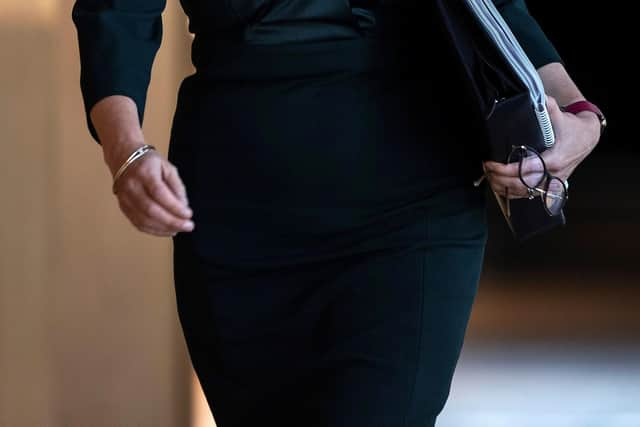GRA reform: Free vote not ruled out, but concerns 'not valid', says Nicola Sturgeon
In a BBC Scotland interview ahead of SNP conference the First Minister was pressed on the controversial Bill that will come before Parliament this year.
Asked whether Cabinet ministers who disagree with the legislation will have to vote for it under the ministerial code, Ms Sturgeon said: "We take decisions before we get to votes, both in a parliamentary group sense and as a government as to whether free votes apply and there have been decisions taken in the past to allow people free votes.
Advertisement
Hide AdAdvertisement
Hide Ad“That’s not a point we’ve got to yet, but generally the principle is for ministers that collective responsibility applies.”


MSPs were offered a free vote – where they are not constrained by party whips – on Scotland’s same-sex marriage Bill in 2014. Eighteen voted against, with 105 for the legislation.
The SNP-Green government wants to reform the 2004 Gender Recognition Act by removing the medical diagnosis of gender dysphoria currently required to receive a Gender Recognition Certificate (GRC). The reform would also reduce the time a person has to live in their “acquired gender” from two years to six months, and lower the age at which someone can apply for a GRC from 18 to 16.
Analysis of responses on a second consultation on the proposals, which received more than 17,000 submissions, has just been published, but did not give any overall percentage of those in favour or against reform.
Ms Sturgeon said she was not “rushing in” to the changes, and suggested women should be more concerned with attacks on their rights in other parts of the world.
"We’ve had two public consultations, we have listened very carefully, but we had a manifesto commitment to move forward with this,” she said.
“Gender recognition reform is about changing an existing process to make it less degrading, intrusive and traumatic for one of the most stigmatised minorities in our society and I think that is a good thing to do.
“It does not change in any way shape or form the legal protections women have and that’s something that’s very important to me as a life-long feminist.”
Advertisement
Hide AdAdvertisement
Hide AdShe added: “We shouldn’t forget there are big threats to women’s safety and rights – they come from sexism, misogyny, principally from abusive and predatory men.
"We see lawmakers in other parts of the world, Texas for example, trying to take away the rights of women to control their own bodies.
"We should focus on the real threats to women, not the threats that, while I appreciate the views are very sincerely held, in my view are not valid.”
However she was criticised by Scottish Conservative MSP, Meghan Gallacher, who said: “It’s wrong for Nicola Sturgeon to overlook the many valid concerns that women have about the erosion of their rights.
“We have to protect women’s rights at the same time as improving the current system for trans people.
“Women are very concerned about the threats to their safety, not from trans people, but from people who could seek to abuse the system. The SNP should be taking those concerns very seriously, not dismissing them.”
Policy analysts MurrayBlackburnMackenzie said the First Minister’s comments showed “a failure to understand the nature of GRA reform, and its implications for women and girls.”
They added: “Scotland is already experiencing a chilling effect on the use of the single-sex exceptions under the 2010 Equality Act, with the rights of women and girls compromised across a range of policy areas, including hospital wards, prison accommodation, school facilities, and sport. Under a self-declaration model these are likely to deteriorate further, as the existing legal protections cited by Ms Sturgeon are rendered increasingly unworkable.”
A message from the Editor:Thank you for reading this article. We're more reliant on your support than ever as the shift in consumer habits brought about by Coronavirus impacts our advertisers.
If you haven't already, please consider supporting our trusted, fact-checked journalism by taking out a digital subscription.
Comments
Want to join the conversation? Please or to comment on this article.
